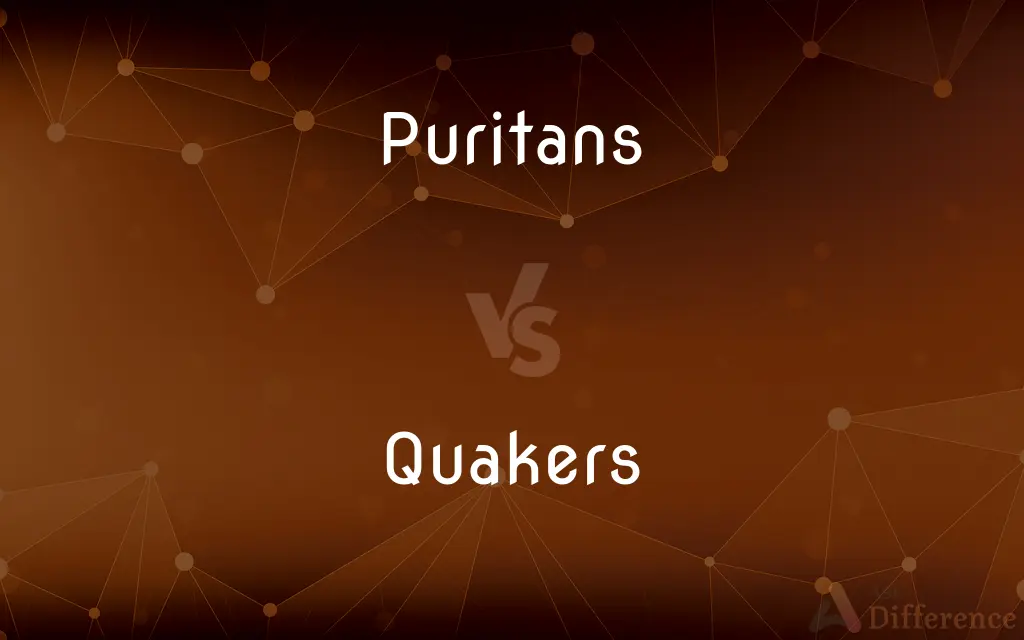Puritans vs. Quakers — What's the Difference?
By Tayyaba Rehman — Updated on November 6, 2023
Puritans were a Protestant group focusing on strict religious discipline, while Quakers are known for their pacifism and inner spirituality.

Difference Between Puritans and Quakers
Table of Contents
ADVERTISEMENT
Key Differences
The Puritans were a group of English Reformed Protestants in the 16th and 17th centuries who sought to "purify" the Church of England from its "Catholic" practices. Quakers, or the Religious Society of Friends, began in the 17th century as a Christian movement that emphasized direct personal experience of God within one's soul. Puritans held a Calvinistic theology, emphasizing predestination and the total depravity of man, whereas Quakers believed in the ability of each person to access the "inner light," or spirit of God within themselves.
Puritans advocated for a congregational church governance and were known for their strict moral code and emphasis on hard work and thrift. In contrast, Quakers rejected formal sacraments and ordained ministry, held meetings that were often silent until moved to speak by the Spirit, and promoted egalitarian principles. The Puritan lifestyle was austere, rejecting what they saw as excess, while Quakers were known for their simple living but were also more permissive in matters of dress and demeanor, guided by conscience rather than a strict moral code.
While Puritans believed in the importance of a learned ministry and often had educated pastors, Quakers believed that God could speak through any person, regardless of formal education. Puritans were heavily involved in the political and educational foundations of the American colonies, such as in Massachusetts, whereas Quakers, with their pacifism and advocacy for social justice, were influential in Pennsylvania and other colonies, promoting religious tolerance and social reform.
Comparison Chart
Origins
16th-century England
17th-century England
Theological Views
Calvinistic, predestination
Inner light, direct experience of God
ADVERTISEMENT
Church Governance
Congregational
Egalitarian, meetings without a formal pastor
Social Principles
Strict moral code, austerity
Pacifism, social justice, equality
Influence on America
Massachusetts Bay Colony, education
Pennsylvania, religious tolerance
Compare with Definitions
Puritans
Followers of Calvinistic beliefs.
Puritans embraced the doctrine of predestination.
Quakers
Members of the Religious Society of Friends.
Quakers hold meetings that can be largely silent.
Puritans
Members of a Protestant group advocating church purification.
The Puritans established a strict religious community in New England.
Quakers
Advocates of pacifism and social justice.
Quakers were instrumental in the abolition movement.
Puritans
Advocates of a strict moral code.
The Puritans frowned upon dancing and revelry.
Quakers
Known for their egalitarian views.
Quakers allowed women to speak at their meetings.
Puritans
Settlers of the Massachusetts Bay Colony.
The Puritans played a significant role in American history.
Quakers
Promoters of simplicity and honesty.
Quakers traditionally dress plainly and speak truthfully.
Puritans
Proponents of simplicity in worship.
The Puritans removed stained glass from their churches.
Quakers
Believers in the 'inner light' guiding personal conduct.
Quakers rely on inward reflection for spiritual guidance.
Puritans
The Puritans were English Protestants in the 16th and 17th centuries who sought to purify the Church of England of Roman Catholic practices, maintaining that the Church of England had not been fully reformed and should become more Protestant. Puritanism played a significant role in English history, especially during the Protectorate.
Quakers
Quakers belong to a historically Protestant Christian set of denominations known formally as the Religious Society of Friends. Members of the various Quaker movements are generally united by a belief in the ability of each human being to experience and access the light within or see "that of God in every one".
Puritans
A member of a group of English Protestants who in the 1500s and 1600s advocated strict religious discipline along with simplification of the ceremonies and creeds of the Church of England.
Quakers
A member of the Society of Friends.
Puritans
Puritan A person who is very strict or austere in religious practice or moral outlook, especially someone who regards pleasure or luxury as sinful.
Quakers
A Christian sect founded by George Fox about 1660; commonly called Quakers
Puritans
Of or relating to the Puritans or Puritanism.
Puritans
Puritan Characteristic of a puritan; puritanical.
Puritans
Plural of puritan
Common Curiosities
Do Quakers believe in baptism?
Quakers do not practice baptism with water, believing in an inward, spiritual baptism.
Do Quakers have ministers?
Quakers do not have ministers or formal clergy; any member may speak at meetings.
What Bible did Puritans use?
Puritans primarily used the Geneva Bible until the King James Version became prevalent.
How do Quakers worship?
Quakers worship in silence until moved by the Spirit to speak; there is no set liturgy.
Are Quakers Christian?
Yes, Quakers are Christians, though they emphasize an experiential faith.
Did Puritans celebrate holidays?
Puritans generally did not celebrate holidays like Christmas, considering them non-biblical.
What's a Puritan work ethic?
The Puritan work ethic is a value system that emphasizes hard work, discipline, and diligence.
Why did Puritans wear plain clothes?
Puritans wore plain clothes to avoid vanity and maintain simplicity.
Were Puritans separatists?
Some Puritans, known as Separatists, believed in completely breaking away from the Church of England.
What is a Quaker meeting house?
A Quaker meeting house is a place of worship for the Religious Society of Friends.
Did Puritans support religious freedom?
Puritans sought religious freedom for themselves but were not always tolerant of other faiths.
What are Quaker testimonies?
Quaker testimonies are expressions of core Quaker beliefs in daily life, like peace and integrity.
What education reforms did Puritans promote?
Puritans established schools and colleges, like Harvard, to ensure a learned ministry.
Can anyone become a Quaker?
Yes, anyone can attend Quaker meetings and become a member of the community.
What legacy did the Puritans leave in America?
Puritans influenced American culture with their values on work ethic, morality, and governance.
Share Your Discovery

Previous Comparison
Chemosynthesis vs. Photosynthesis
Next Comparison
Galactose vs. GlucoseAuthor Spotlight
Written by
Tayyaba RehmanTayyaba Rehman is a distinguished writer, currently serving as a primary contributor to askdifference.com. As a researcher in semantics and etymology, Tayyaba's passion for the complexity of languages and their distinctions has found a perfect home on the platform. Tayyaba delves into the intricacies of language, distinguishing between commonly confused words and phrases, thereby providing clarity for readers worldwide.















































